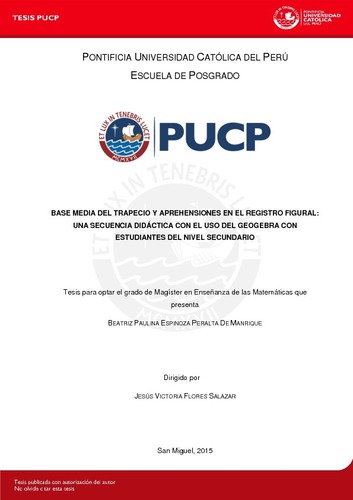Base media del trapecio y aprehensiones en el registro figural : una secuencia didáctica con el uso del geogebra con estudiantes del nivel secundario
Abstract
La presente investigación tiene por objetivo analizar como los estudiantes de 4º año de
secundaria de Educación Básica Regular conjeturan la propiedad de la base media cuando
articulan las aprehensiones en el registro figural en una secuencia didáctica en la que utilizan
el Geogebra, para lo cual nos planteamos la siguiente pregunta de investigación ¿Cómo
estudiantes de secundaria conjeturan la propiedad de la base media del trapecio cuando
articulan las aprehensiones en el registro figural en una secuencia didáctica con el uso del
Geogebra? Utilizamos como base teórica aspectos de la teoría de Registros de Representación
Semiótica y aspectos de la Ingeniería Didáctica como marcos teórico y metodológico
respectivamente. La secuencia didáctica de la investigación está formada por tres actividades,
las cuales permiten que los estudiantes realicen tratamientos y conversiones. Específicamente
en el registro figural analizamos las articulaciones de las aprehensiones secuencial,
perceptiva, operatoria y discursiva que realizaron los estudiantes. Observamos también que
los estudiantes movilizaron sus conocimientos previos sobre el trapecio y otros elementos de
la geometría. Señalamos también que utilizaron la función arrastre y herramientas del
Geogebra para realizar tratamientos en el registro figural, la cual les permitió observar
diferentes configuraciones del objeto representado, articular aprehensiones, relacionar
conocimientos y establecer conjeturas. Finalmente, mediante la articulación de las
aprensiones en el registro figural, los estudiantes lograron conjeturar la propiedad de la base
media del trapecio. The present research aims to analyze how 4-grade high school students from Regular Basic
Education conjecture the property of the median of a trapezoid when they put together the
apprehensions in the figurative register in a didactic sequence in which they use Geogebra. To
do this, we pose the following research question: how do high school students conjecture the
property of the median of a trapezoid when they put together the apprehensions in the
figurative register in a didactic sequence by using Geogebra? As theoretical basis, we used
aspects from the theory of Registers of Semiotic Representation as well as aspects from
Didactic Engineering as theoretical and methodological framework respectively. The didactic
sequence of the research is made up of three activities, which allow students to perform
treatments and conversions. In the figurative register we specifically analyzed the interactions
of the sequential, perceptual, operative and discursive apprehensions students performed. We
also observed that students mobilized their previous knowledge on trapezoids and other
elements of geometry. We also noted that they used the dragging function and tools from
Geogebra to perform treatments in the figurative register, which allowed them to observe
different configurations of the represented object, put together apprehensions, relate
knowledge, and establish conjectures. Finally, by putting together the apprehensions in the
figurative register, students managed to conjecture the property of the median of a trapezoid.
Temas
Matemáticas--Estudio y enseñanza (Secundaria).
Geometría--Estudio y enseñanza.
Educación secundaria--Investigaciones.
Geometría--Estudio y enseñanza.
Educación secundaria--Investigaciones.
Para optar el título de
Maestro en la enseñanza de las Matemáticas






